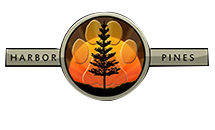
A Pet-Friendly Home for the Holidays
As you prepare for the holidays, don’t forget to include your furry companions in your plans, or that decorations, toxic plants, unhealthy treats, and increased activities can pose risks to your pets. Here are some tips and resources from the Harbor Pines Veterinary Center to help ensure a safe, enjoyable holiday season for all family members.
Oh, Christmas tree!
Gazing at a beautifully decorated tree can be a peaceful experience—unless your pet decides your lovely tree is a new play toy. The following pet-proofing ideas can help keep your pet safe and your tree intact:
- Restrict access — Consider keeping your tree in an area inaccessible to your pet, or surrounded by a dog pen.
- Secure your tree — Use an appropriate-sized, secure tree stand to ensure your tree cannot topple over easily. Also, consider securing the tree to the ceiling with fishing line.
- Preservatives — Cover your tree water to prevent your pet from drinking chemical preservatives added to commercial trees, and use fresh water without additives.
- Artificial or real — Shedding needles or flocking from real trees can be ingested and cause intestinal obstruction. An artificial tree may not be as enticing for your pet to chew, and will prevent mouth irritation from tree oils.
- Decorative lights and cords — Strategically place lights higher up your tree. Also, a chewed electrical wire can cause mouth damage, breathing problems, or deliver a potentially lethal shock.
- Tinsel and ribbon — Avoid glittery tinsel and ribbons that can be irresistible to your pet, especially cats, because ingestion can cause a linear foreign body intestinal obstruction.
- Ornaments — Display your delicate glass ornaments out of your pet’s reach, and use unbreakable ornaments on your tree, especially toward the bottom. Consider using ornament anchors to keep your ornaments on your tree.
- Ornament hooks — Use soft hooks rather than metal hooks, to prevent damage to your pet’s mouth, esophagus, stomach, or intestines if ingested.
- Something different — Try hanging your tree upside-down from your ceiling or mounted on your wall for a change of pace, and provide the ultimate in pet-proofing.
Deck the halls!
What is a holiday without decorative plants and candles? However, look around your home from your pet’s perspective, and keep these dangerous items well out of paws’ reach:
- Candles — Curious cats and dogs’ wagging tails can knock over candles and result in burns, or possibly start a fire. Consider battery-operated candles as a safe alternative.
- Plants — Mistletoe, holly, and poinsettias can cause gastrointestinal upset and mouth irritation. Mistletoe ingestion can also affect the heart. Any parts of a lily, including pollen, are extremely toxic to cats and can cause kidney failure.
- Potpourri — Many essential oils in potpourri are toxic to cats and can cause vomiting, drooling, difficulty breathing, seizures, and possible death.
- Pine cones — Dogs may see these decorations as delightful chew toys, but they can cause intestinal obstruction if ingested.
Eat, drink, and be merry!
A delicious feast is the highlight of any holiday, but keep your pets out of the kitchen to reduce temptation, and put your scraps and leftovers in a tightly sealed garbage container. Many high-fat holiday foods, such as turkey skin, stuffing, and ham, can cause an upset stomach and pancreatitis. In addition to fatty foods, the following are dangerous to pets:
- Onions, garlic, and chives — Cats can develop life-threatening anemia from eating only a small amount, and dogs can be affected by eating larger quantities.
- Raisins and grapes — Consumption of only a few raisins or grapes can damage some dogs’ kidneys.
- Bread dough — Pets who consume yeasty bread dough can develop painful gas, intestinal bloating, and alcohol poisoning from yeast fermentation.
- Chocolate — Vomiting, diarrhea, hyperactivity, abnormal heart rhythm, tremors, and seizures can occur in dogs who consume a toxic chocolate dose. The darker the chocolate, the more toxic to pets.
- Sugar-free treats — Xylitol-containing products can cause precipitous drops in blood glucose, liver failure, and seizures in pets.
- Alcohol — Pets and adult beverages don’t mix, and consumption can cause weakness, respiratory problems, or collapse.
Peace on Earth, good will toward all!
Create a “safe space” for your pet, such as a gated-off area, spare room, or crate, to help them stay calm amidst new people and noises, and prevent them from scooting out the door or getting into trouble. Make your pet’s safe space a relaxing environment by playing music or TV, with treats, toys, water, a comfortable bed, a litter box for the cat, and perhaps a food puzzle. More pets escape during holiday distractions, so now is the time to get them a nametag and a microchip, and ensure that your contact information is current.
Make a pet safety checklist, and check it twice to ensure you avoid holiday pet hazards. Let all your family members and guests know your holiday “pet rules,” and keep the phone numbers of the Pet Poison Helpline, ASPCA Poison Control Hotline, and Harbor Pines Veterinary Center, as well as the local pet emergency clinic, in a visible, easily accessible location.
Our Harbor Pines Veterinary Center team wishes you and your family a safe, happy holiday season. Don’t hesitate to contact us if you have questions about helping your pet get safely through the holidays, or suspect they got into mischief and need veterinary care.

